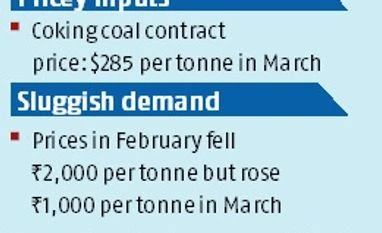Rising input costs and softening of steel prices are likely to throw a long shadow on steel companies’ performance in the fourth quarter (Q4) of the current financial year (2016-17, or FY17).
Spot prices of coking coal, a key input in manufacturing steel, have more than halved from the peak level of $320 (Rs 20,800) a tonne in December; but contract prices for March are at $285 (Rs 18,525) a tonne. On the other hand, a sluggish demand in the domestic sector has pulled down steel prices.
In February, steel prices came down by Rs 2,000 a tonne. This month, the fall was arrested by the announcement of a hike of Rs 1,000 a tonne, but producers said there were hardly any transactions at this level.
“It’s more a boost to the sentiment,” said a steel producer.
Credit rating agency ICRA, too, said in a report it would be difficult to sustain the upward revision of steel prices. Domestic prices were now costlier than the landed cost of imported counterparts.
“Given the continuing sluggishness in the key real estate and construction sectors, ICRA expects the overall steel consumption growth for FY17 to be lower than the previous year,” the ICRA report said.
According to the Joint Plant Committee figures, between April and February, consumption of non-alloy steel increased 4.4 per cent to 69.34 million tonnes; that of alloy steel dropped by 9 per cent to 6.6 million tonnes.
The committee is empowered by the Government of India to collect data on the steel sector.
Domestic steel consumption usually picks up sequentially in the third quarter after the retreat of monsoon and consequent increase in construction activity. However, with the demonetisation of high value currencies in November last year, the consumption growth in Q3 FY17 dropped by 2.4 per cent quarter on quarter, ICRA said.
Prime Minister Narendra Modi had announced the demonetisation of Rs 500 and Rs 1,000 notes, sucking out about 86 per cent of the currency in circulation, and causing a slowing of demand.
Steelmakers were hopeful that demand, which seemed to have gained in March, would continue.
Dilip Oommen, chief executive officer and managing director, Essar Steel, said, “We have witnessed the strengthening of demand in the domestic market in March this year after a sedate demand in January and February.”
But Q4 FY17 is unlikely to be anything to write home about.
Operating margins of the steel industry improved to 16.3 per cent in Q3 FY17 from 13.4 per cent in Q2, on the back of increased realisations after the imposition of anti-dumping duties, said ICRA. It added in the current quarter (Q4), profit margins of steel producers were likely to remain under pressure, as most of the high-cost coking coal inventory would be consumed.
“In Q3, spot prices of coking coal were higher than contract prices. So if companies switched to the contract market during that time, they would feel cost pressures now because the situation has reversed in Q4,” Jayanta Roy, senior vice-president and group head, corporate ratings, ICRA, said.
Industry opinion is also divided on whether or not the situation would improve in the next quarter (April to June) — also the first quarter of the next financial year (FY18).
Essar Steel’s Oommen said there was a clear indication domestic demand would revive. “The demand for flat steel is growing at 4-6 per cent. We expect it to gather momentum once the government’s planned expenditure on infrastructure and low-cost housing starts. In defence and infrastructure, the Budget allocation is $80 billion (Rs 5.2 lakh crore).”
He added, “The government’s emphasis on renewable energy, especially solar power, as well as policies such as Make in India and a push for domestic steel to be used for domestic projects would also drive demand.” However, another producer, who did not want to be named, said global steel prices were softening and had corrected to $15-20 a tonne. “When prices start falling, they don’t stop at one correction.”
ICRA’s Roy, too, said coking coal contracts were likely to be settled at lower prices, given the substantially lower price levels in the spot market at present. So a part of the justification for higher steel prices would no longer be applicable. Also, there was still a global overcapacity, so steel prices could soften from the current levels.
Unlock 30+ premium stories daily hand-picked by our editors, across devices on browser and app.
Pick your 5 favourite companies, get a daily email with all news updates on them.
Full access to our intuitive epaper - clip, save, share articles from any device; newspaper archives from 2006.
Preferential invites to Business Standard events.
Curated newsletters on markets, personal finance, policy & politics, start-ups, technology, and more.
)